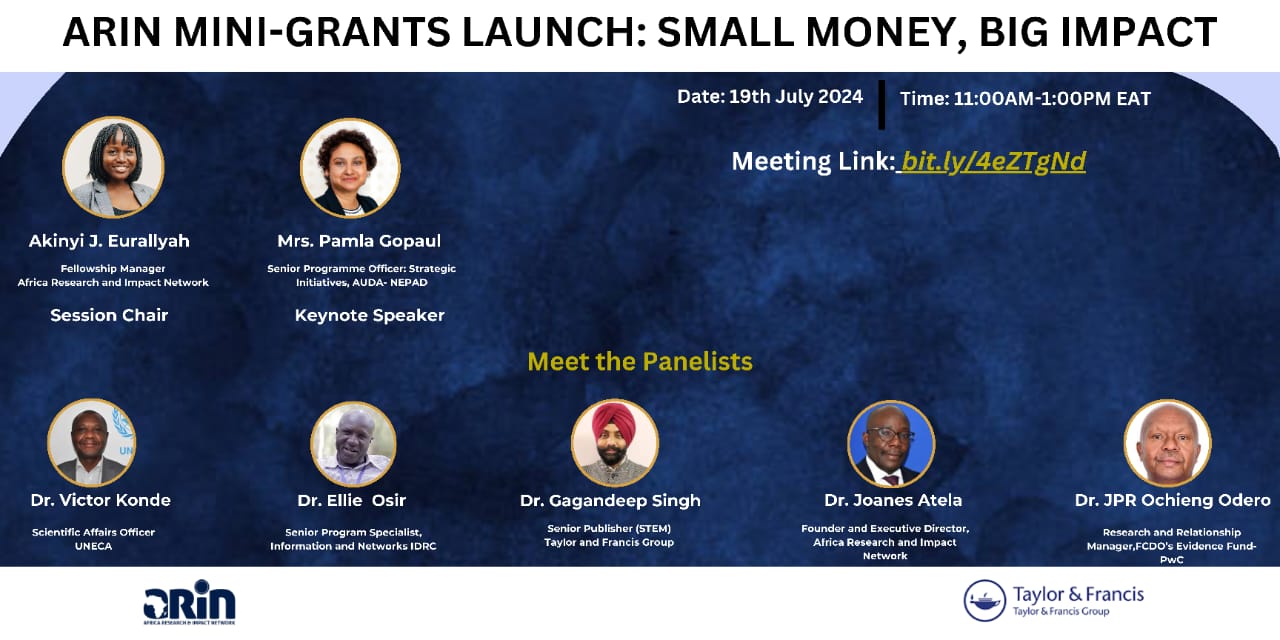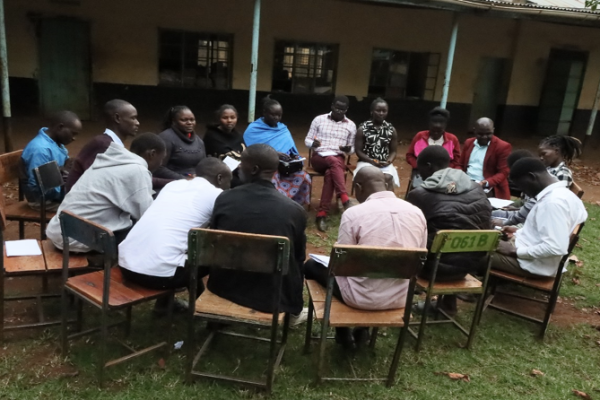By:Diana Muthusi and Nancy Mutwii
The launch of the ARIN Science-Policy Mini-grants and Mentorship Scheme, along with the virtual signing of the Memorandum of Understanding (MOU) between The Africa Research and Impact Network (ARIN) and Taylor and Francis (TF), was held virtually on 19th July 2024. The event attracted over one hundred participants from a diverse range of participants, including researchers, policy makers, and students.
The Mini-grant and Mentorship Scheme will serve as a stepping stone to bridge the gap faced by African researchers in securing funding to conduct evidence-based research. Through this partnership, the beneficiaries of the mini-grants will receive mentorship on research and publication, enabling them to produce high-quality research outputs such as book volumes. These outputs will be launched at the biennial ARIN Africa Research-Policy Fellows Assembly, which is held towards the end of the year, with the next one scheduled for November 2024 in Nairobi, Kenya. Additionally, the research will be published on the Taylor and Francis platform.
Dr. Joanes Atela, the Executive Director of ARIN, highlighted the need for a new Mini-grant and Mentorship Scheme in his opening remarks. He raised concerns about how the diverse range of projects and publications contribute to development and help solve societal challenges. Dr. Atela emphasized that research should always strive for the betterment of society and not merely exist on paper. He pointed out that despite Africa having many researchers, they are often excluded from funding opportunities due to rigorous funding procedures and conditions. Additionally, Dr. Atela referenced IPCC reports, arguing that despite Africa bearing the brunt of climate change effects, there are very limited contributions from African researchers in IPCC publications. To address this, ARIN aims to create a platform through the scheme where early-career researchers across the continent can secure funding opportunities. This initiative seeks to strengthen evidence-based research and contribute to the public agenda by increasing research outputs, particularly publications on climate change and Science, Technology and Innovation
Ms Pamla Gopaul a Senior Program Manager Senior Programme Manager at African Union Development Agency-NEPAD keynote speech addressed that the scheme would lead to capacity building of the early career researchers and also create a catalyst for them to deliver on impactful research and empirical research tailored to address the challenges and opportunities that resonates with the needs of the Africans. She mentioned that she has been participating in the development arena through attending the G20 meetings and they are now narrowing down to the specifics on how they would shape the narrative, the wordings that resonate with the people. In her speech, she classified Africa as a “Wisdom Bank” because of how different researchers from across the globe from different development organizations want to research more about Africa. This raises the aspect of decolonizing research in that more Africans should be able to get more avenues for funding that is less vigorous like the ARIN’S Mini-grant and Mentorship Scheme to be able to conduct more research. This is because they would be able to come up with more concrete solutions that are tailor made to fit the needs of our people. She underscored the need for the Scheme to embrace research that has not always been repeatedly addressed in the past but to ensure through the scheme, concrete, implementable and tangible solutions are intensified to help bridge the knowledge gap. Finally, she expressed her interest in showcasing some of the research outputs from the scheme on the various platforms available at the African Union and Development agency.
The Panel discussion was graced by remarkable speakers who provided valuable insights on various important issues. These experts shared their knowledge and perspectives, contributing to a rich and informative dialogue
Dr. Victor Konde from the UN Economic Commission for Africa (UNECA) addressed measures that international agencies like UNECA are undertaking to strengthen national systems, accelerate the Sustainable Development Goals (SDGs), and support African Union (AU) aspirations. He also discussed how UNECA is empowering early career researchers to drive innovation and entrepreneurship opportunities in Africa. Dr. Victor Konde highlighted that UNECA’s work focuses on policy research, advocacy, presenting Africa’s needs globally, and offering technical support to other countries. He emphasized that building a good innovation ecosystem on the continent could enable Africa to develop market-ready solutions. Some Initiatives that he mentioned that UNECA was implementing, included: Alliance of Universities, a network of approximately 14 universities with close to 35,000 researchers whose next forum is scheduled to take place in Nairobi. The main goal is to ground universities in their local systems, enabling them to work with local people to implement solutions rather than relying on foreign researchers. Second initiatives are building a continental platform for problem-solving which aims at connecting researchers with local people to address identified problems and develop solutions. Lastly the biomedical engineering initiative that proved beneficial during the COVID-19 pandemic, with the researchers engaged in providing Personal Protective Equipment (PPE) and designing ventilators.
Dr. Ellie Osir, a senior program specialist in Information and Networks working with the IDRC highlighted the challenges experienced in working with the Science Granting Councils Initiative (SGCI Africa ), a multi-donor initiative funded by IDRC Canada aimed at enhancing the capacities of councils to manage ,design, and monitor research programmes using robust science, technology, and innovation indicators, and outlined how early career researchers can play a pivotal role in generating STI research for the initiative. A major challenge experienced in working with the Initiative as highlighted by Dr Ellie is the lack of integration of policies in the councils remits as seen in National Research Fund in Kenya whereby all matters of policy are handled by National Commission for Science, Technology & Innovation(NACOSTI). Significant accomplishments achieved by the initiative include; supporting the capacity of the councils in developing their grant management systems and practices, supporting their capacity to enable them position themselves as key policy leaders and champions in their specific countries, supporting countries without the councils to establish their own in addition to supporting the nurturing of multilateral and bi-lateral partnerships within the councils.
The initiative has been actively supporting the councils to fund research with a percentage of the funding directed to students and early career researchers especially women researchers. A variety of opportunities are provided by IDRC for the early career researchers including programs such as early career fellowships for gender equality in science and funding the Organization for Women in Science for the Developing World (OWSD) which provides research training, career development and networking opportunities for women scientists throughout the developing world at different stages in their career.
Dr JPR Ochieng-Odero a Research and Relationship Manager at the Foreign, Commonwealth and Development Office (FCDO’s) Evidence Fund ,outlined some of the challenges that he has encountered while generating and consolidating evidence especially for policy making and also some of the capacity building initiatives being implemented .He stated that the main challenge is the over competitiveness the local researchers whom he referred to as regional supplies like universities, research organizations face from the global North researchers which he expressed it as a major concern because the funds are intended on building the capacity of our Africa researchers who fail to seize such opportunities and end up either working for foreign researchers which he described them as “spanner boys” and spanner girls” He further stated that the Evidence fund aims to continuously build the capacity of our researchers to be able to improve the ability of writing convincing and winning proposals as this was also another problem faced by early researchers. In relation to this he mentioned a scheduled virtual Early Market Engagement that would take place on the 23rd July 2024, whose objective would be to highlight the obstacles faced by researchers while accessing the funding opportunities.
Dr. Wilber Ottichilo, the current governor of Vihiga County, provided insights from a local government perspective. He pointed out that county governments possess robust data that requires analysis. However, he noted that most decision-making processes at the county level are typically based on political will and the interests of those involved, rather than on the collected data. He emphasized the need for county governments to establish research divisions. He cited Vihiga County as an example, where such a division exists and is set to scale up to a fully-fledged research unit. This unit would ensure the coordination of all research activities across all sectors within the county.
Dr. Gagandeep Singh, a senior publisher at the Taylor & Francis Group, provided an overview of the challenges and funding processes in publishing. He highlighted key considerations for early researchers, including awareness of different publishers, publishing modes, journals, books, articles, mediums, and their accessibility. He emphasized the dynamic nature of publishing, which involves rigorous procedures at various research levels, such as different referencing styles. Just like Dr JPR Ochieng-Odero and Dr. Ottichilo, he mentioned the importance of proposal writing, highlighting the need for researchers to be mentored on how to write the technical elements of a research proposal. Furthermore, he identified the significance of time management, noting that researchers should ensure proper planning to produce high-quality publications. Dr. Singh proposed several key questions for early researchers to ask themselves to distinguish themselves in any publishing group, including: why they have decided to write, what topics they will be considering in the book, what the title will be, and how many pages they will be writing. He also emphasized the importance of considering the time available before the submission process and encouraged the use of social media platforms to promote research outputs. His speech was just the tip of the iceberg of what the Mini-grants and Mentorship Scheme would bring forth that proved to be beneficial to early career researchers.
In conclusion, the launch of the Science-Policy Mini-grants and Mentorship Scheme, in partnership with ARIN and Taylor & Francis, promises to be a transformative opportunity for early career researchers. This initiative not only addresses the pressing challenges of limited funding, underrepresentation in global publications, and the need for comprehensive mentorship but also empowers researchers to contribute significantly to the global scientific community. By bridging these gaps, the scheme paves the way for a more inclusive research environment, fostering innovation and excellence in the next generation of Africa’s early career researchers.
© ARIN Press, 2024


